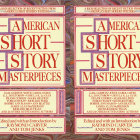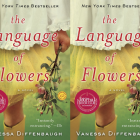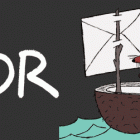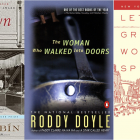Pioneer Girl
 Pioneer Girl
Pioneer Girl
Bich Minh Nguyen
Viking Adult, February 2014
$26.95
304 pages
Genre: literary mystery
With reference to: Little House on the Prairie
And: immigrant lit & ethnic lit
And: restlessness vs. belonging
Also: Manifest Destiny & Utopia
Concerning: Lee Lien, jobless English PhD
And: a (possibly) very well-travelled gold pin
Surface questions:
- Is the gold pin an heirloom of Laura Ingalls Wilder?
- If so, why did her daughter Rose Wilder Lane leave it behind in Saigon in 1965?
- And why did Lee’s brother leave it behind when he disappeared with their mother’s jewelry and all the cash from their family café, the Lotus Leaf?
- And, while we’re pursuing these questions, what is it like to live in America today?
Lee’s sidekicks on this journey:
- Alex, her Iowa-MFA-candidate not-quite-boyfriend
- Amy, her San Francisco-based “sell out” friend
- Gregory, a librarian in San Francisco
Lee’s adversaries:
- Her mother, who wants Lee and her brother to remain at home helping with the Lotus Leaf until they each marry, and who thinks Lee’s PhD is for “fake” doctors.
- Her elusive brother, who fled home and refuses to let on his whereabouts.
Time moves: linearly
Space unravels: meanderingly, through Laura and Rose’s haunts in the Midwest and in Elysian San Francisco
Language feels: expository, unadorned, approachable
With colorful flourishes for: house wares, furnishings, food—objects of home
For example: “‘[California is t]he land of gold and honey and citrus, like the oranges in the Christmas stockings.’”
Entertaining metaphor: the ubiquitous mid-American Chinese buffet (which Lee’s parents worked in for years) as a modern Manifest Destiny
To wit: “Maybe you start to feel, as I have, like the food is free, that the whole of it is yours. That you ought to claim more and more, even if you don’t eat it […] Eat now, forget tomorrow.”
Parallels with Little House?
- Lee’s family, like the pioneering family, moves constantly, looking for better situations.
- Relentless worry about bitter misery in Wilder’s books also seems to parallel Lee’s mother’s relentlessness as a difficult, domineering person.
Deep questions:
- What is real?
- What is fake?
- Who is allowed to tell which stories?
At times:
- Lee’s observations about pop culture, hipster culture, what contemporary life is like, feel a little too facile, even occasionally mean-spirited.
- Plot points occasionally feel too lucky or too convenient (e.g., unlocked doors, compliant librarians).
- Maybe that is intentional.
- Maybe those facile observations and too convenient coincidences are meant to call attention to the story as a story.
Furthermore:
- The ending is not glib.
- The ending, building upon the mysteries the Little House books and the Wilders, and on the mysteries of Lee’s family and the mysteries of our larger ideas of home, is nuanced, affecting, and, ultimately, satisfying.
Do you need to read Little House on the Prairie to enjoy Pioneer Girl? Not really. Nguyen provides ample context.
Should you read it anyway? Yes.



